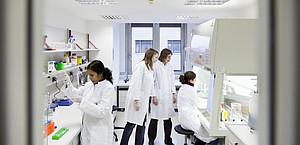
Leibniz Center for Photonics in Infection Research (LPI)
As a user-open research and development platform, LPI facilitates fundamentally new technical solutions for diagnostics, monitoring, and therapeutics. Very promising treatment approaches are transferred quickly to routine clinical applications.
Challenge and Relevance
Infectious diseases lead to a steadily increasing number of deaths and endanger the continued development of state-of-the-art high-performance medicine. Common causes include the worldwide spread of (multi-)resistant bacteria and fungi, the appearance of still unknown pathogens, and life-threatening infections in immune-compromised patients, for example in oncology. In combination with molecular biological methods, photonic technologies have proven their enormous potential in sustainably solving the pressing problems in infection diagnostics in the past few years.
What is LPI?
LPI’s goal is to fight infectious diseases with the help of innovative photonics-based diagnostics and therapeutic methods. Using completely novel, national and international user-open research infrastructure – along an entire innovation pipeline (i.e., from the idea to the validated method) – novel diagnostic technologies and therapeutic approaches will be implemented. LPI combines a wide range of photonic technologies, including completely new, internationally unique, light-based methods, with molecular biological methods and enabling technologies (e.g., microfluidics) to be used directly in clinical applications. The researched and prototype-based diagnostic and therapeutic approaches are implemented via flying study nurses during the course of the value chain directly in a multicenter clinical validation process. This concept is truly unprecedented and an ideal approach to efficiently and quickly develop the potential of photonic technologies for routine clinical processes.
LPI’s technology platform consists of spatially-resolved and time-resolved spectroscopic imaging technology platforms, novel multimodal imaging technologies from the XUV to FIR spectral ranges, and photonic molecular biological point-of-care technologies that make it possible to diagnose and treat both difficult-to-treat infections and infections that occur during the course of immune suppression and known associated diseases. Photonic technologies are combined with biomedical technologies such as different “omics” methods, next-generation sequencing, and other enabling technologies such as microfluidics.
Access and User Groups
User access for:
- Diagnostics/monitoring technology researchers and developers from academic photonics research and the industry and
- Medical doctors/biologists and chemists from the field of infection research and synthetic chemistry.
These research groups approach LPI on their own initiative (technology push) or are identified by LPI technology scouts and motivated to carry out their research activities at LPI (technology pull).
